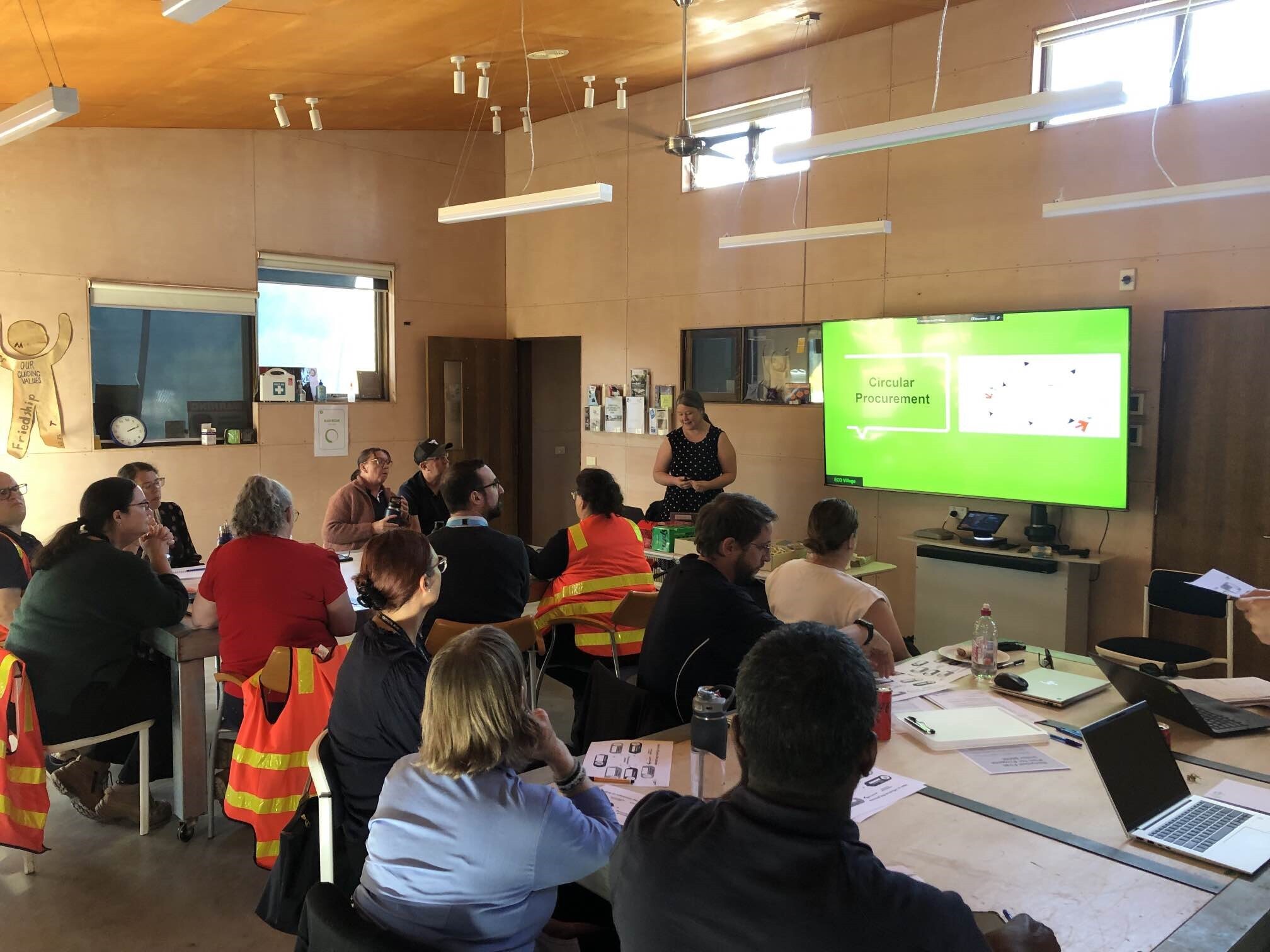From workshops to waste facility – circular economy support delivers for the Mallee
 Circular Economy 101 workshop held at Mildura in May 2025
Circular Economy 101 workshop held at Mildura in May 2025 Sustainability Victoria is backing councils across regional Victoria to turn circular economy thinking into action – and results. Recent work in the Mallee demonstrates how targeted capability building, strategic funding, and Sustainability Victoria's brokerage role can convert early ideas into lasting infrastructure.
Practical training, long-term change
In May, Sustainability Victoria delivered two circular economy workshops in Mildura, bringing together staff from across council departments – including procurement, engineering, sustainability and resource recovery.
To date, more than 250 participants from 47 councils have taken part in the Circular Economy 101 Workshops, which are designed to introduce the circular economy as a practical, business-focused approach to boosting economic resilience, supporting regional prosperity, and reducing environmental impact.
The training, held at the EcoLiving Centre (itself an Sustainability Victoria-funded initiative from over a decade ago), gave participants the tools to identify circular opportunities within existing procurement and operations processes.
‘Workshops like these shift thinking and practice at the same time,’ said Jessica Morthorpe, Sustainability Victoria's Regional Engagement Lead. ‘We equip councils to apply circular principles in real-world scenarios – and we create the internal networks to support those shifts over the long term.’
Workshops covered both foundational circular economy knowledge and procurement-specific tools and case studies, with strong emphasis on cross-team engagement. Similar sessions have been rolled out across regional Victoria – including Warrnambool, Mansfield, and Bass Coast – to build capability and opportunity across Victoria.
"Waste and pollution are not just environmental issues – they are economic inefficiencies. Supporting circular approaches helps councils cut waste costs, build local capacity, and create new opportunities for jobs and investment."
Funding feasibility, backing delivery
Education is only one part of the equation. Sustainability Victoria's funding programs have been critical to converting circular economy proposals into operational infrastructure.
A clear example is the new organics processing facility in Ultima, launched in May by Swan Hill Rural City Council. The upgraded facility began as a feasibility study funded through Sustainability Victoria's Circular Economy Councils Fund in 2020, later co-funded for construction through the Circular Economy Organics Sector Transformation Fund.
Co-funded by Sustainability Victoria, the Commonwealth Government and the Council, the $1.35 million facility can process up to 2,500 tonnes of organic material each year. It will support 14 construction jobs and three ongoing roles – and lays the groundwork for future regional collaboration on food and garden organics (FOGO) services.
‘Waste and pollution are not just environmental issues – they are economic inefficiencies. Supporting circular approaches helps councils cut waste costs, build local capacity, and create new opportunities for jobs and investment,’ said Luke Wilkinson, Manager Regional Engagement at Sustainability Victoria.
‘Councils that support circular economy initiatives help build stronger, more resilient local economies,’ Mr Wilkinson said. ‘In doing so, councils position themselves as leaders in climate action and long-term economic prosperity.’
Representatives from 6 regional councils, including from NSW, attended the site visit.
 Launch of the new organics processing facility in Ultima
Launch of the new organics processing facility in Ultima A broker of regional outcomes
Sustainability Victoria’s role extends beyond grants. By acting as a connector – between councils, industry, and funding bodies – Sustainability Victoria enables regional councils to navigate complex circular economy transitions with practical confidence.
Across the Circular Economy Councils Fund, Sustainability Victoria has supported:
- 38 feasibility studies and 27 implementation projects
- 79 councils and alpine resorts engaged
- A 94% increase in regional organics processing capacity
- A 52% lift in additional government investment sustainability, conservation, climate change.
This structured, multi-stage support ensures that regional projects don’t stall at the idea phase. Councils are better equipped to scope, fund and deliver solutions that cut emissions, reduce landfill, and strengthen local economies.
The Mallee case studies highlight what happens when circular economy policy is backed by practical engagement and strategic funding. From workshops to waste processing facilities, it’s proof of concept – and it’s happening across Victoria.

